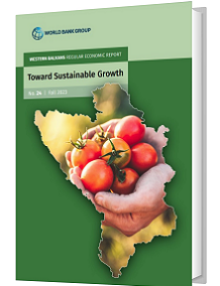
Towards sustainable growth

Amid weakening global demand, growth in the Western Balkans has slowed over the course of 2022 and into 2023. On the one hand, the slowdown in global demand for goods has contributed to lower than expected industrial production in the EU and the Western Balkans, weighing on Bosnia -Herzegovina, North Macedonia and Serbia. . In contrast, global demand for services proved more resilient, particularly for travel, which benefited Albania, Kosovo and Montenegro.
The region’s labor market continued to strengthen in 2023, against all expectations. The region’s average employment rate reached an all-time high of 47.8 percent in June 2023. This labor market recovery has also benefited vulnerable groups – young people and women – with youth unemployment falling to 22.7 percent by mid-2023, the lowest on record. but still above 14.3% in the EU27 in June 2023. In 2023, labor shortage remained one of the main concerns raised by companies in the Western Balkans.
As inflation remains at historic highs through 2023, poverty rates in the region are expected to continue their downward trend, albeit at a slower pace. Despite recent momentum in post-pandemic years, labor force participation rates in the Western Balkans continue to lag behind other countries with similar levels of economic development, and gender disparities persist in all countries , despite a gradual increase in women’s participation in the labor market.
Despite continued external volatility, all Western Balkan countries are expected to continue to post budget deficits in 2023 that are below or close to their 2021 levels.while maintaining high social protection spending and continuing to spend more on public salaries in 2023.
Inflationary pressures in the Western Balkans are easing, although price pressures persist. The region’s financial sector has remained stable and resilient despite growing risks.
Growth is expected to slow in the Western Balkans in 2023, then gradually recover over the medium term., but the risks remain oriented to the downside. Growth rates in Europe are expected to be lower than the pre-pandemic five-year average, suggesting the recovery is still weak.
Reforms are needed to consolidate the recovery towards sustainable growth, while negotiations with the EU could potentially improve prospects in the Western Balkans. THE spotlight on greening agriculture in the Western Balkans finds that, as the agricultural sector undergoes a major structural transformation, efforts to make agriculture green are important to ensure access to the EU market and for the competitiveness of agriculture, the rural development and food and nutritional security.

Country notes

Country specific chapters:
North Macedonia Macedonian | Albanian


